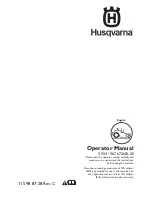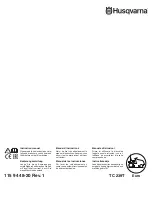
Not for
Reproduction
24
Gradually move both ground speed control levers — evenly
FORWARD from neutral. Slow down and repeat.
Note:
Straight forward travel takes practice. If necessary, top
speed can be balance-adjusted — see the
Speed Balancing
Adjustment
in the MAINTENANCE PROCEDURES section of
this manual.
Reverse Travel Practice
16
LOOK DOWN AND BEHIND, then gradually move both
ground speed control levers evenly BACK from neutral. Slow
down and repeat.
Note:
Practice backing up for several minutes before
attempting to do so near objects. The zero-turn riding mower
turns sharply in reverse as well as forward, and backing up
straight takes practice.
Practice Turning Around A Corner
17
While traveling forward allow one ground speed control lever
to gradually return back toward neutral. Repeat several times.
Note:
To prevent pivoting directly on the tire tread, it is best to
keep both wheels going at least slightly forward.
Practice Turning in Place
18
To turn in place, “zero-turn,” gradually move one ground
speed control lever forward from neutral and the other lever
back from neutral simultaneously. Repeat several times.
Note:
Changing the amount each ground speed control lever
is pulled—forward or back, changes the “pivot point” you turn
on.
Advanced Driving
Executing an End-Of-Row Zero-Turn
19
Your zero-turn riding mower's unique ability to turn in place
allows you to turn around at the end of a cutting row rather
than having to stop and Y-turn before starting a new row.
For example, to execute a left end-of row zero turn:
1. Slow down at the end of the row.
2. Move the RIGHT ground speed control lever forward
slightly while moving the LEFT ground speed control lever
back to center and then slightly back from center.
3. Begin mowing forward again.
This technique turns the unit LEFT and slightly overlaps the
row just cut — eliminating the need to back up and re-cut
missed grass.
















































